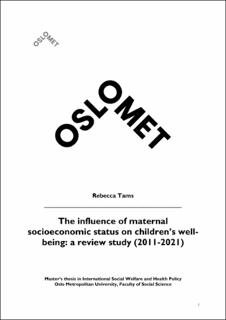| dc.description.abstract | Background: Wellbeing is a sustainable condition that allows the individual to develop and succeed. Children’s wellbeing is strongly determined by the quality of their family, including their mother. The improvement of care for low maternal SES during pregnancy does not only have an effect on the women themselves, but also on the life of their children, partners and in the long run for the society. The research question is as therefore as follows: What is the scientific knowledge status on the influence that low maternal SES during pregnancy has on the future well-being of the fetus and child? This thesis seeks to create an overview of the current research of how low maternal SES during pregnancy influences the outcomes of the fetus and child.
Method: To answer the research question, a scoping review study has been conducted using 26 scientific publications from 2011 till 2021. These have again been sorted into five different groups according to their topic. The groups are as follows: smoking, diet, mental health, prenatal care, breastfeeding and bonding.
Result: The results of the studies show that low maternal SES does influence the behavior of the women during pregnancy, which also affects the fetus and child. The most common researched SES indicator among the studies were education. Having a low education showed to influence the smoking behavior, the diet choices, odds of having a mental health problem and probability to use the prenatal care offered negatively, during pregnancy. It also showed to influence the breastfeeding habits of the mother and bonding with the child.
Conclusion: The findings show that there is still a need for interventions on policy level to try to reduce the inequality gap for low maternal SES women. Women having a lower SES may have less education, be more likely to have an unhealthy diet, and have barriers to attend healthcare for prenatal visits. Less education contributes to less knowledge about pregnancy, such how harmful smoking can be for the fetus and child or the importance of a balanced diet. Moreover, the maternal well-being of the mother does not only affect herself, but also her children as well. As a result, efforts to improve women’s socio-economic well-being may yield benefits for generations to come. | en_US |
